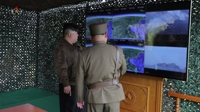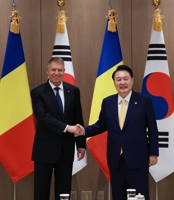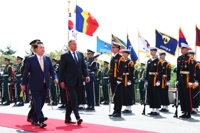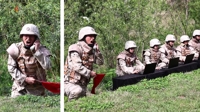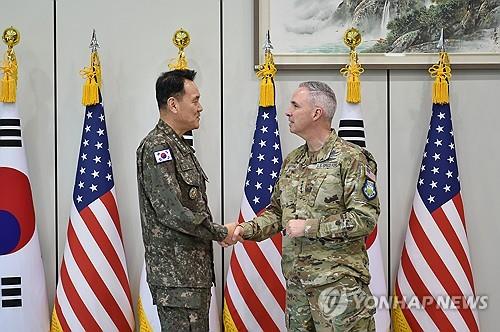(News Focus) N.K. sanctions legislation provides powerful tools, but effectiveness unclear: U.S. expert
By Chang Jae-soon
WASHINGTON, Feb. 12 (Yonhap) -- The package of sanctions on North Korea that has passed through Congress provides powerful new tools, but it is unclear how stringently they will be implemented and whether they will lead to real policy change in Pyongyang, a U.S. expert said Friday.
The House approved the North Korea Sanctions Enforcement Act of 2016 in a 408-2 vote, just two days after the Senate unanimously passed the legislation in a demonstration of bipartisan support for a tough response to Pyongyang's nuclear and missile tests.
Richard Nephew, a former State Department sanctions expert, said that the legislation is notable on three points, including one that requires the imposition of penalties on those who conduct business with North Korea in support of its various illicit acts.
The bill also requires imposing sanctions on key industrial inputs for the North, such as coal and precious metals, if they are used to support illicit activities. Moreover, the legislation also requires the treasury secretary to determine whether the North is a primary money laundering concern, he said.
Such a designation would "deepen North Korea's ostracization in international banking by threatening any institution that maintains banking relationships with North Korean banks with having its links to the U.S. financial sector severed," Nephew said in an article carried by 38 North.
"Taken altogether, these sanctions would -- in a normal economy -- be a profound threat and could prompt real policy change on the part of their target," said Nephew, who is currently with the Center on Global Energy Policy at Columbia University's School of International and Public Affairs.
"Many of these ideas are rooted in the panoply of sanctions imposed against Iran from 1996-2013, which arguably had their desired effect on the Iranian economy and, in time, decision-making in that they forced the Iranian leadership to seek a diplomatic accommodation for international concerns with its nuclear program," he said.
However, he pointed out the challenges facing implementation of the legislation.
"The adoption of a sanctions bill does not itself achieve results. Certainly, as critics have suggested, the U.S. government has to demonstrate that it will follow up on the sanctions threat through action in order for it to be feared," he said.
One of the biggest challenges to its implementation would be winning cooperation from China, he said.
"In a normal economy, you wouldn't have a single country dependency that skews the analysis. With North Korea, you do," Nephew said in an email to Yonhap News Agency, referring to the North's economic reliance on China.
The U.S. may be prepared to encounter some economic and political contretemps with China over the North, but it is "doubtful that any but the most myopic of sanctions advocates would be prepared to sacrifice U.S.-China relations on the altar of North Korea sanctions," he said.
He also noted that the North's leadership has shown a staggering lack of care for its population and therefore it is doubtful that mere pressure on its economy would translate into a strategic rethink. On the contrary, sanctions could push the North to seek more nuclear weapons to deter the threat of regime change, he said.
"Overall, sanctions should not be seen in this context as the easier path out of this current crisis or a low risk way of managing the North Koreans," Nephew said. "They could just as easily precipitate a worsening crisis."
Bruce Klingner, a senior Korea expert at the Heritage Foundation, said that Friday's passage of the sanctions legislation showed that Congress was frustrated by the "timid incrementalism" of President Barack Obama's administration.
"The legislation closes loopholes, adds measures, and strengthens potential responses. But Congressional insistence in some sections of the text to make enforcement of U.S. laws mandatory rather than discretionary is revealing and damning of Obama's approach," he said.
He accused Obama of squandering opportunities to more effectively impede the North's progress on nuclear and missile programs and force it to comply with U.N. resolutions.
"The U.S. needs to sharpen the choices for North Korea by raising the risk and cost for those violating laws and resolutions and who have been willing so far to facilitate North Korea's prohibited programs and illicit activities," Klingner said.
"Hopefully, President Obama will enforce U.S. laws more resolutely than he has to date," he said.
jschang@yna.co.kr
(END)
-
 Overdue debut of Korean abstract art pioneer Yoo Young-kuk at Venice Biennale
Overdue debut of Korean abstract art pioneer Yoo Young-kuk at Venice Biennale -
 Relax, immerse yourself in scents at Venice Biennale's Korean Pavilion
Relax, immerse yourself in scents at Venice Biennale's Korean Pavilion -
 S. Korea marks 30th anniv. of Korean Pavilion at Venice Biennale with contemporary art
S. Korea marks 30th anniv. of Korean Pavilion at Venice Biennale with contemporary art -
 Artist Lee Bae captures ethereal Korean aesthetics at Venice Biennale
Artist Lee Bae captures ethereal Korean aesthetics at Venice Biennale -
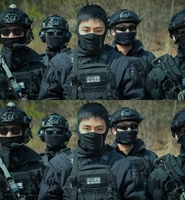 Facebook page unveils photos of BTS member V in counter-terrorism unit gear
Facebook page unveils photos of BTS member V in counter-terrorism unit gear
-
 Overdue debut of Korean abstract art pioneer Yoo Young-kuk at Venice Biennale
Overdue debut of Korean abstract art pioneer Yoo Young-kuk at Venice Biennale -
 Relax, immerse yourself in scents at Venice Biennale's Korean Pavilion
Relax, immerse yourself in scents at Venice Biennale's Korean Pavilion -
 Artist Lee Bae captures ethereal Korean aesthetics at Venice Biennale
Artist Lee Bae captures ethereal Korean aesthetics at Venice Biennale -
 S. Korea marks 30th anniv. of Korean Pavilion at Venice Biennale with contemporary art
S. Korea marks 30th anniv. of Korean Pavilion at Venice Biennale with contemporary art -
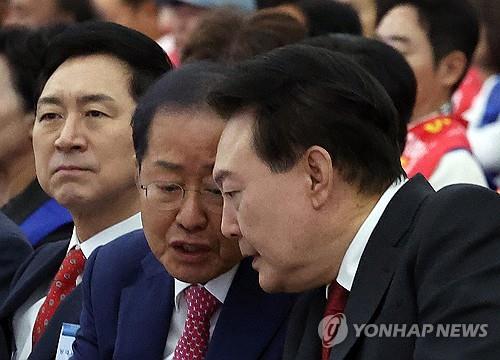 Yoon, Daegu mayor met to discuss post-election matters: sources
Yoon, Daegu mayor met to discuss post-election matters: sources
-
 Hybe says spinoff attempt by subsidiary label revealed clearly
Hybe says spinoff attempt by subsidiary label revealed clearly -
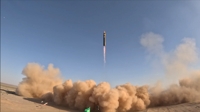 (LEAD) N. Korea sends economic delegation to Iran amid suspected military cooperation
(LEAD) N. Korea sends economic delegation to Iran amid suspected military cooperation -
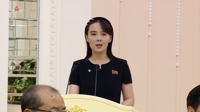 N.K. leader's sister slams joint S. Korea-U.S. military drills
N.K. leader's sister slams joint S. Korea-U.S. military drills -
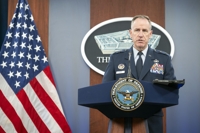 Pentagon stresses close consultation with S. Korea after simulated N.K. 'nuclear counterattack' drill
Pentagon stresses close consultation with S. Korea after simulated N.K. 'nuclear counterattack' drill -
 Author of ADOR's 'internal document' refutes allegations of spinoff plot
Author of ADOR's 'internal document' refutes allegations of spinoff plot















